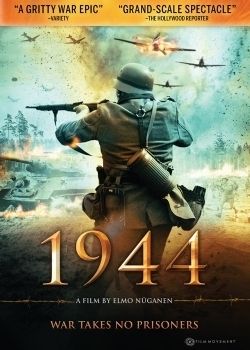| Title: | 1944 |
| Director: | Elmo Nüganen |
| Cast: | Kaspar Velberg, Kristjan Üksküla, Maiken Schmidt |
| Released: | 2015 |
| Playing time: | 100 minutes | Description: | In 2015, a war movie was released which depicts both the perspective of the German army as well as that of the Red Army. "1944" was produced in Estonia. In February 2015, the movie opened in Berlin. The movie is laid at the end of World War Two between July 25 and August 10, 1944. the movie shows the fighting between soldiers of the Waffen-SS and those fighting in the Red Army. 71 years ago, thousands of men fought in Estonia on both sides. The Soviet Union invaded Estonia in 1940. Deportations and mass murders followed. After the attack by Hitler-Germany on the Soviet Union, Estonia was occupied by German forces. Some Estonians sided with Hitler-Germany. The movie begins with the battle for the Tannenberg and the viewer sees soldiers of the Waffen-SS fighting against Soviet tanks like the T-34-85. The leading role in the first part of he movie is played by an Estonian who has voluntary chosen to join the Waffen-SS because his family has been deported to Siberia by Soviet soldiers. Along with a number of other solders of the Waffen-SS, including Dutchmen, he fights compatriots who have sided with the Red Army. Fellow countrymen slaughtering each other. It becomes clear that in times of war good and bad are often not clearly distinguishable. The line between good and bad is sometimes very thin. "1944" does not deal with the Second World War in Estonia between 1944 and 1945 as such but is more like a personal movie seen from a soldier’s eye. On both sides – Waffen-SS and the Red Army – soldiers fight who have chosen for Hitler-Germany or the Soviet Union for personal reasons. The lead player in the first part of the movie – member of the Waffen-SS – wants to set the deportation of his family straight. Killing his opponents may mean revenge to him but killing Soviet soldiers will not bring back his family. In the second part of the movie, we see a Soviet soldier who must suppress certain events if he wants to make promotion. His boss, a Soviet Kommissar tells him he has to watch suspicious persons and report. The Kommissar seems to be a fanatic follower of Stalinist terror and suppression. The soldier himself has experienced horrible things and suppresses them. Later on, he falls in love He is suspected and eventually stands before his boss in a forest. "1944" is a captivating movie showing both sides of the war in Estonia. Both in the Waffen-SS and in the Red Army there are individuals who made choices based on personal experience or conviction. There were scoundrels and bad guys in both the Waffen-SS and the Red Army. The Soviet Kommissar stands as an example. It becomes clear that not all Waffen-SS soldiers are bad guys, as emerges from other publications and movies. Thus, the leading actor saves a little girl at the risk of his own life. Fact is that Waffen-SS soldiers were often politically motivated and – in particular in the first stages of the war – convinced of Nazi ideology. Fanatism occurred often. In times of war, humans are often beasts, not only people who are evil or make bad choices. So, on German side, not only the Waffen-SS committed crimes but the regular Wehrmacht as well. Not only Nazism in Germany but Stalinism in the Soviet Union also are synonymous with terror. A remarkable feature in the movie is the use of authentic weaponry and vehicles. The Soviet T-34-85 is a real tank and not a replica. German weapons such as the Mauser K98, StG 44 (Sturmgeschütz) MP 40 and MG 42 (Maschinen Pistole, Maschinen Gewehr) are authentic. Soviet weapons such as the Mosin-Nagant and machine pistol PPSh-41 are genuine weapons. As regards language, it is not an English spoken movie, leading players speak their native tongue. Both factors make the movie realistic. "1944" is captivating and not one sided in comparison to other war movies. Estonia is a relatively unknown subject as far as war movies go. Most movie fans know the American perspective of the war thanks to "Saving Private Ryan," "Band of Brothers" and other war movies. Glorification of the home country is absent in "1944." It is commendable when new movies are released based on themes like role and deployment of various, less investigated countries or armies where an attempt is made to paint an objective picture. One could think of movies about Belgium, Spain or Italy during the war. Conclusion: "1944" is captivating and shows different perspectives. It is a successful war movie. |
| Rating: |    (Good) (Good) |
Information
- Translated by:
- Arnold Palthe
- Article by:
- Ruben Krutzen
- Published on:
- 08-11-2017
- Last edit on:
- 09-06-2018
Images


